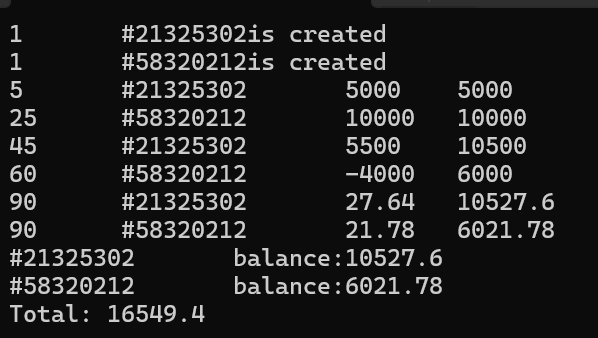试验2 c++
任务1:
t.h:
#pragma once
#include <string>
// 类T: 声明
class T {
// 对象属性、方法
public:
T(int x = 0, int y = 0);// // 普通构造函数
T(const T& t);// // 复制构造函数
T(T&& t);// // 移动构造函数
~T(); // // 析构函数
void adjust(int ratio);// // 按系数成倍调整数据
void display() const; // // 以(m1, m2)形式显示T类对象信息
private:
int m1, m2;
// 类属性、方法
public:
static int get_cnt(); // // 显示当前T类对象总数
public:
static const std::string doc; // // 类T的描述信息
static const int max_cnt;// // 类T对象上限
private:
static int cnt; // // 当前T类对象数目
// 类T友元函数声明
friend void func();
};
// 普通函数声明
void func();
t.cpp:
// 类T: 实现
// 普通函数实现
#include "t.h"
#include <iostream>
#include <string>
using std::cout;
using std::endl;
using std::string;
// static成员数据类外初始化
const std::string T::doc{ "a simple class sample" };
const int T::max_cnt = 999;
int T::cnt = 0;
// 对象方法
T::T(int x, int y) : m1{ x }, m2{ y } {
++cnt;
cout << "T constructor called.\n";
}
T::T(const T& t) : m1{ t.m1 }, m2{ t.m2 } {
++cnt;
cout << "T copy constructor called.\n";
}
T::T(T&& t) : m1{ t.m1 }, m2{ t.m2 } {
++cnt;
cout << "T move constructor called.\n";
}
T::~T() {
--cnt;
cout << "T destructor called.\n";
}
void T::adjust(int ratio) {
m1 *= ratio;
m2 *= ratio;
}
void T::display() const {
cout << "(" << m1 << ", " << m2 << ")";
}
// 类方法
int T::get_cnt() {
return cnt;
}
// 友元
void func() {
T t5(42);
t5.m2 = 2049;
cout << "t5 = "; t5.display(); cout << endl;
}
task1.cpp:
#include "t.h"
#include <iostream>
using std::cout;
using std::endl;
void test();
int main() {
test();
cout << "\nmain: \n";
cout << "T objects'current count: " << T::get_cnt() << endl;
}
void test() {
cout << "test class T: \n";
cout << "T info: " << T::doc << endl;
cout << "T objects'max count: " << T::max_cnt << endl;
cout << "T objects'current count: " << T::get_cnt() << endl << endl;
T t1;
cout << "t1 = "; t1.display(); cout << endl;
T t2(3, 4);
cout << "t2 = "; t2.display(); cout << endl;
T t3(t2);
t3.adjust(2);
cout << "t3 = "; t3.display(); cout << endl;
T t4(std::move(t2));
cout << "t3 = "; t4.display(); cout << endl;
cout << "T objects'current count: " << T::get_cnt() << endl;
func();
}
运行结果截图:
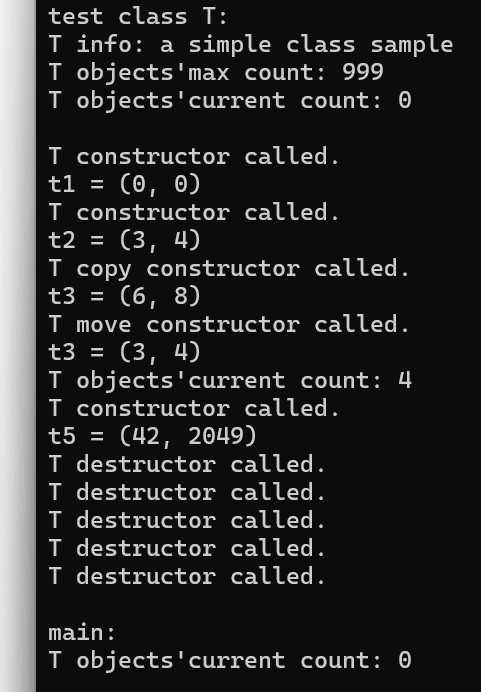
问题1:不能编译,声明友元函数不是定义函数,编译器找不到该函数的定义

问题2:
构造函数:
功能:用于创建类的实例并初始化对象的成员变量,参数 x 和 y 用于初始化对象的 m1 和 m2 成员,该构造函数还提供默认参数,允许在创建对象时不传递参数。
时机:当通过 T t; 或 T t(5, 10); 这样的方式实例化对象时,普通构造函数被调用。
复制构造函数:
功能:用于通过现有对象创建新对象,复制其成员变量的值。该构造函数特别用于需要传递对象副本的情况,比如通过值传递的函数参数。
时机:当对象通过复制进行初始化时,如在函数传参、返回对象等情况下将会调用复制构造函数。例如,T t2 = t1; 或函数参数为 T t(T t1)。
移动构造函数:
功能:用于通过转移(而非复制)另一个对象的资源来创建新对象。它允许对象“窃取”另一个对象的成员数据而不是复制,以提高性能,尤其是在处理动态分配的资源时。
时机:当一个对象通过移动语义(例如,使用 std::move)进行初始化时调用,如 T t2 = std::move(t1);。
析构函数:
功能:通常用于释放对象所占用的任何资源,比如动态内存、文件句柄或其他系统资源。析构函数在对象生命周期结束时执行,用于执行清理工作。
时机:当栈上的对象超出作用域或动态分配的对象通过 delete 被销毁时,析构函数会被调用。例如,局部对象在函数结束时自动调用析构函数,而使用 new 创建的对象在调用 delete 时会调用析构函数。
问题3:
不能编译 const std::string类型的成员不能包含类内初始值设定项,static int cnt = 0;带有类内初始值的设定项必须是常数
实验2:
Complex.h:
#ifndef COMPLEX_H
#define COMPLEX_H
#include <string>
class Complex {
private:
double real;
double imag;
public:
static const std::string doc;
Complex(double r = 0.0, double i = 0.0);
double get_real() const;
double get_imag() const;
void add(const Complex& c);
friend Complex add(const Complex& c1, const Complex& c2);
friend bool is_equal(const Complex& c1, const Complex& c2);
friend bool is_not_equal(const Complex& c1, const Complex& c2);
friend void output(const Complex& c);
friend double abs(const Complex& c);
};
#endif
Complex.cpp:
#include <iostream>
#include <cmath>
#include "Complex.h"
const std::string Complex::doc = "a simplified complex class";
Complex::Complex(double r, double i) : real(r), imag(i) {}
double Complex::get_real() const {
return real;
}
double Complex::get_imag() const {
return imag;
}
void Complex::add(const Complex& c) {
real += c.real;
imag += c.imag;
}
Complex add(const Complex& c1, const Complex& c2) {
return Complex(c1.real + c2.real, c1.imag + c2.imag);
}
bool is_equal(const Complex& c1, const Complex& c2) {
return (c1.real == c2.real) && (c1.imag == c2.imag);
}
bool is_not_equal(const Complex& c1, const Complex& c2) {
return !is_equal(c1, c2);
}
void output(const Complex& c) {
std::cout << c.real << " + " << c.imag << "i" << std::endl;
}
double abs(const Complex& c) {
return std::sqrt(c.real * c.real + c.imag * c.imag);
}
task2.cpp:
#include "Complex.h"
#include <iostream>
using std::cout;
using std::endl;
using std::boolalpha;
void test() {
cout << "类成员测试: " << endl;
cout << Complex::doc << endl;
cout << endl;
cout << "Complex对象测试: " << endl;
Complex c1;
Complex c2(3, -4);
const Complex c3(3.5);
Complex c4(c3);
cout << "c1 = "; output(c1);
cout << "c2 = "; output(c2);
cout << "c3 = "; output(c3);
cout << "c4 = "; output(c4);
cout << "c4.real = " << c4.get_real() << ", c4.imag = " << c4.get_imag() << endl;
cout << endl;
cout << "复数运算测试: " << endl;
cout << "abs(c2) = " << abs(c2) << endl;
c1.add(c2);
cout << "c1 += c2, c1 = "; output(c1);
cout << boolalpha<<"c1 == c2 : " << is_equal(c1, c2) << endl;
cout << boolalpha<<"c1 != c3 : " << is_not_equal(c1, c3) << endl;
c4 = add(c2, c3);
cout << "c4 = c2 + c3, c4 = "; output(c4); cout << endl;
}
int main() {
test();
}
运行结果截图:
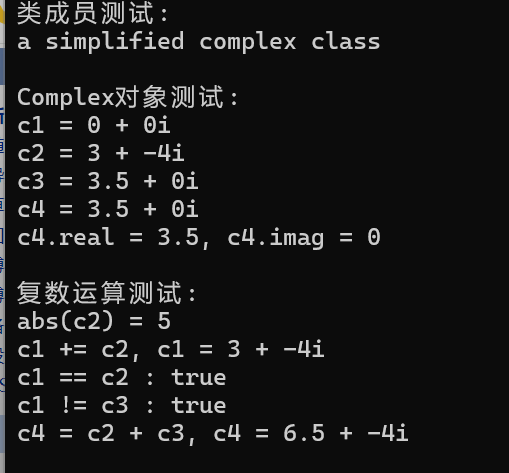
实验三:
task3:
#include <iostream>
#include <complex>
using std::cout;
using std::endl;
using std::boolalpha;
using std::complex;
void test() {
cout << "标准库模板类comple测试: " << endl;
complex<double> c1;
complex<double> c2(3, -4);
const complex<double> c3(3.5);
complex<double> c4(c3);
cout << "c1 = " << c1 << endl;
cout << "c2 = " << c2 << endl;
cout << "c3 = " << c3 << endl;
cout << "c4 = " << c4 << endl;
cout << "c4.real = " << c4.real() << ", c4.imag = " << c4.imag() <<
endl;
cout << endl;
cout << "复数运算测试: " << endl;
cout << "abs(c2) = " << abs(c2) << endl;
c1 += c2;
cout << "c1 += c2, c1 = " << c1 << endl;
cout << boolalpha;
cout << "c1 == c2 : " << (c1 == c2) << endl;
cout << "c1 != c3 : " << (c1 != c3) << endl;
c4 = c2 + c3;
cout << "c4 = c2 + c3, c4 = " << c4 << endl;
}
int main() {
test();
}
运行结果截图:
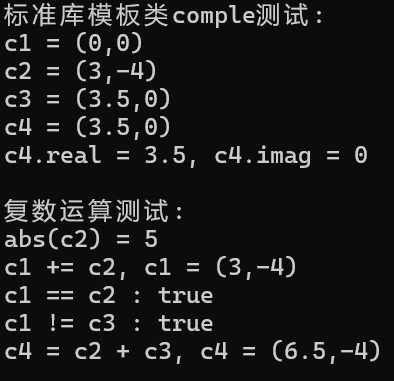
实验四:
Fraction.h:
#pragma once
#include <string>
class Fraction {
// 对象属性、方法
public:
Fraction(int x , int y = 1); // 构造函数
Fraction(const Fraction& t);// 拷贝构造函数
Fraction(std::string s);// 字符串构造函数
~Fraction(); // 析构函数
int get_up() const;
int get_down() const;
Fraction negative() const {
return Fraction(-m1, m2); // 创建并返回负的分数
}// // 以(m1, m2)形式显示T类对象信息
private:
int m1, m2;
std::string str;
// 类属性、方法
// 化简分数的方法
int gcd(int a, int b) {
return b == 0 ? a : gcd(b, a % b);
}
void simplify() {
int gcd1 = gcd(m1, m2); // 求最大公约数
m1 /= gcd1;
m2 /= gcd1;
// 处理负号确保分母为正
if (m2 < 0) {
m1 = -m1;
m2 = -m2;
}
}
public:
static const std::string doc;// // 类T的描述信息
private:
// 类T友元函数声明
friend void output(const Fraction& f);
friend Fraction add(const Fraction& f1, const Fraction& f2);
friend Fraction sub(const Fraction& f1, const Fraction& f2);
friend Fraction mul(const Fraction& f1, const Fraction& f2);
friend Fraction div(const Fraction& f1, const Fraction& f2);
};
// 普通函数声明
void func();
Fraction.cpp:
// 类T: 实现
// 普通函数实现
#include "Fraction.h"
#include <iostream>
#include <string>
using std::cout;
using std::endl;
using std::string;
// static成员数据类外初始化
const std::string Fraction::doc{ "Fraction类 v 0.01版. \n目前仅支持分数对象的构造、输出、加 / 减 / 乘 / 除运算." };
// 对象方法
Fraction::Fraction(int x, int y) : m1{ x }, m2{ y } {
simplify();
}
Fraction::Fraction(const Fraction& t) : m1{ t.m1 }, m2{ t.m2 } {
}
Fraction::Fraction(std::string s):str{ s } {
cout << s << endl;
}
Fraction::~Fraction() {
}
int Fraction::get_up() const {
return m1;
}
int Fraction::get_down() const {
return m2;
}
// 友元
// 输出分数的友元函数
void output(const Fraction& f) {
std::cout << f.m1 << "/" << f.m2;
}
void output(const std::string& s)
{
std::cout << s;
}
// 加法友元函数
Fraction add(const Fraction& f1, const Fraction& f2) {
return Fraction(f1.m1 * f2.m2 + f2.m1 * f1.m2,
f1.m2 * f2.m2);
}
// 减法友元函数
Fraction sub(const Fraction& f1, const Fraction& f2) {
return Fraction(f1.m1 * f2.m2 - f2.m1 * f1.m2,
f1.m2 * f2.m2);
}
// 乘法友元函数
Fraction mul(const Fraction& f1, const Fraction& f2) {
return Fraction(f1.m1 * f2.m2, f1.m1 * f2.m2);
}
// 除法友元函数
Fraction div(const Fraction& f1, const Fraction& f2) {
if (f2.m1 == 0) {
return Fraction(std::string("分母不能为0.报错!!"));
}
return Fraction(f1.m1 * f2.m2, f1.m2 * f2.m1);
}
task4.cpp:
#include "Fraction.h"
#include <iostream>
using std::cout;
using std::endl;
void test1() {
cout << "Fraction类测试: " << endl;
cout << Fraction::doc << endl << endl;
Fraction f1(5);
Fraction f2(3, -4), f3(-18, 12);
Fraction f4(f3);
cout << "f1 = "; output(f1); cout << endl;
cout << "f2 = "; output(f2); cout << endl;
cout << "f3 = "; output(f3); cout << endl;
cout << "f4 = "; output(f4); cout << endl;
Fraction f5(f4.negative());
cout << "f5 = "; output(f5); cout << endl;
cout << "f5.get_up() = " << f5.get_up() << ", f5.get_down() = " << f5.get_down() << endl;
cout << "f1 + f2 = "; output(add(f1, f2)); cout << endl;
cout << "f1 - f2 = "; output(sub(f1, f2)); cout << endl;
cout << "f1 * f2 = "; output(mul(f1, f2)); cout << endl;
cout << "f1 / f2 = "; output(div(f1, f2)); cout << endl;
cout << "f4 + f5 = "; output(add(f4, f5)); cout << endl;
}
void test2() {
Fraction f6(42, 55), f7(0, 3);
cout << "f6 = "; output(f6); cout << endl;
cout << "f7 = "; output(f7); cout << endl;
cout << "f6 / f7 = "; output(div(f6, f7)); cout << endl;
}
int main() {
cout << "测试1: Fraction类基础功能测试\n";
test1();
cout << "\n测试2: 分母为0测试: \n";
test2();
}
运行结果截图:
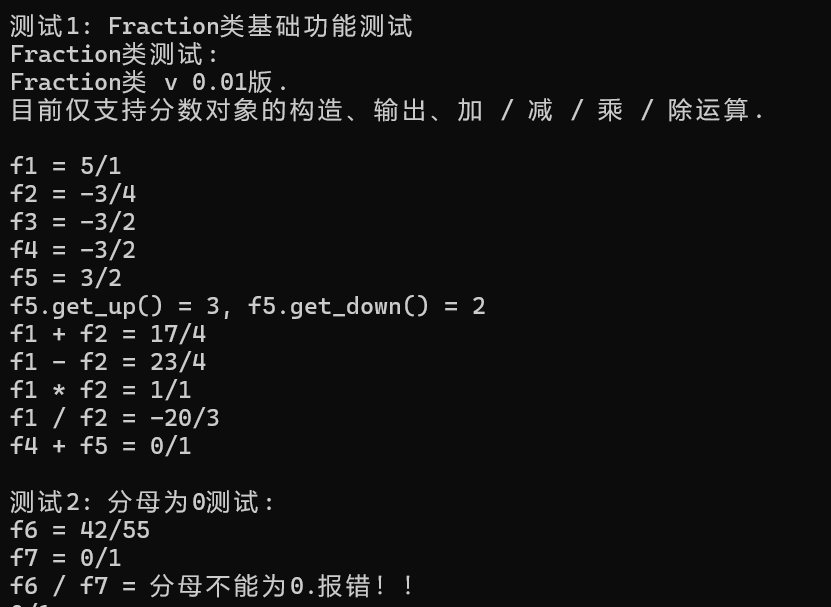
实验五:
account.h:
#ifndef ACCOUNT_H
#define ACCOUNT_H
class SavingsAccount {
private:
int id;
// 账号
double balance;
// 余额
double rate;
// 存款的年利率
int lastDate;
// 上次变更余额的时期
double accumulation;
// 余额按日累加之和
static double total;
// 所有账户的总金额
// 记录一笔账, date为日期, amount为金额, desc为说明
void record(int date, double amount);
// 获得到指定日期为止的存款金额按日积值
double accumulate(int date)const {
return accumulation + balance * (date - lastDate);
}
public:
//构造函数
SavingsAccount(int date, int id, double rate);
int getId() const { return id; }
double getBalance() const { return balance; }
double getRate() const { return rate; }
static double getotal() { return total; }
void deposit(int date, double amount);
//存入现金
void withdraw(int date, double amount);
//取出现金
// 结算利息, 每年1月1日调用一次该函数
void settle(int date);
// 显示账户信息
void show() const;
};
#endif // _ _ACCOUNT_H_
account.cpp:
#include "account.h"
#include<iostream>
#include<cmath>
using namespace std;
double SavingsAccount :: total =0;
// SavingsAccount类相关成员函数的实现
SavingsAccount::SavingsAccount(int date, int id, double rate)
: id(id), balance(0), rate(rate), lastDate(date), accumulation(0) {
cout << date << "\t#" << id << "is created" << endl;
}
void SavingsAccount::record(int date, double amount) {
accumulation = accumulate(date);
lastDate = date;
amount = floor(amount * 100 + 0.5) / 100;
balance += amount;
total += amount;
cout << date << "\t#" << id << "\t" << amount << "\t" << balance << endl;
}
void SavingsAccount::deposit(int date, double amount) {
record(date, amount);
}
void SavingsAccount :: withdraw(int date, double amount){
if (amount > getBalance())
cout << "Error: not enough money" << endl;
else
record(date, -amount);
}
void SavingsAccount :: settle(int date) {
double interest = accumulate(date) * rate / 365;
if (interest != 0)
record(date, interest);
accumulation = 0;
}
void SavingsAccount::show() const {
cout << "#" << id << "\tbalance:" << balance;
}
5_11.cpp:
#include "account.h"
#include<iostream>
using namespace std;
int main() {
// 建立几个账户
SavingsAccount sa0(1, 21325302, 0.015);
SavingsAccount sal(1, 58320212, 0.015);
//几笔账目
sa0.deposit(5, 5000);
sal.deposit(25, 10000);
sa0.deposit(45, 5500);
sal.withdraw(60, 4000);
// 开户后第90天到了银行的计息日, 结算所有账户的年息
sa0.settle(90);
sal.settle(90);
// 输出各个账户信息
sa0.show(); cout << endl;
sal.show(); cout << endl;
cout << "Total: " <<SavingsAccount::getotal() << endl;
return 0;
}
运行结果截图:
